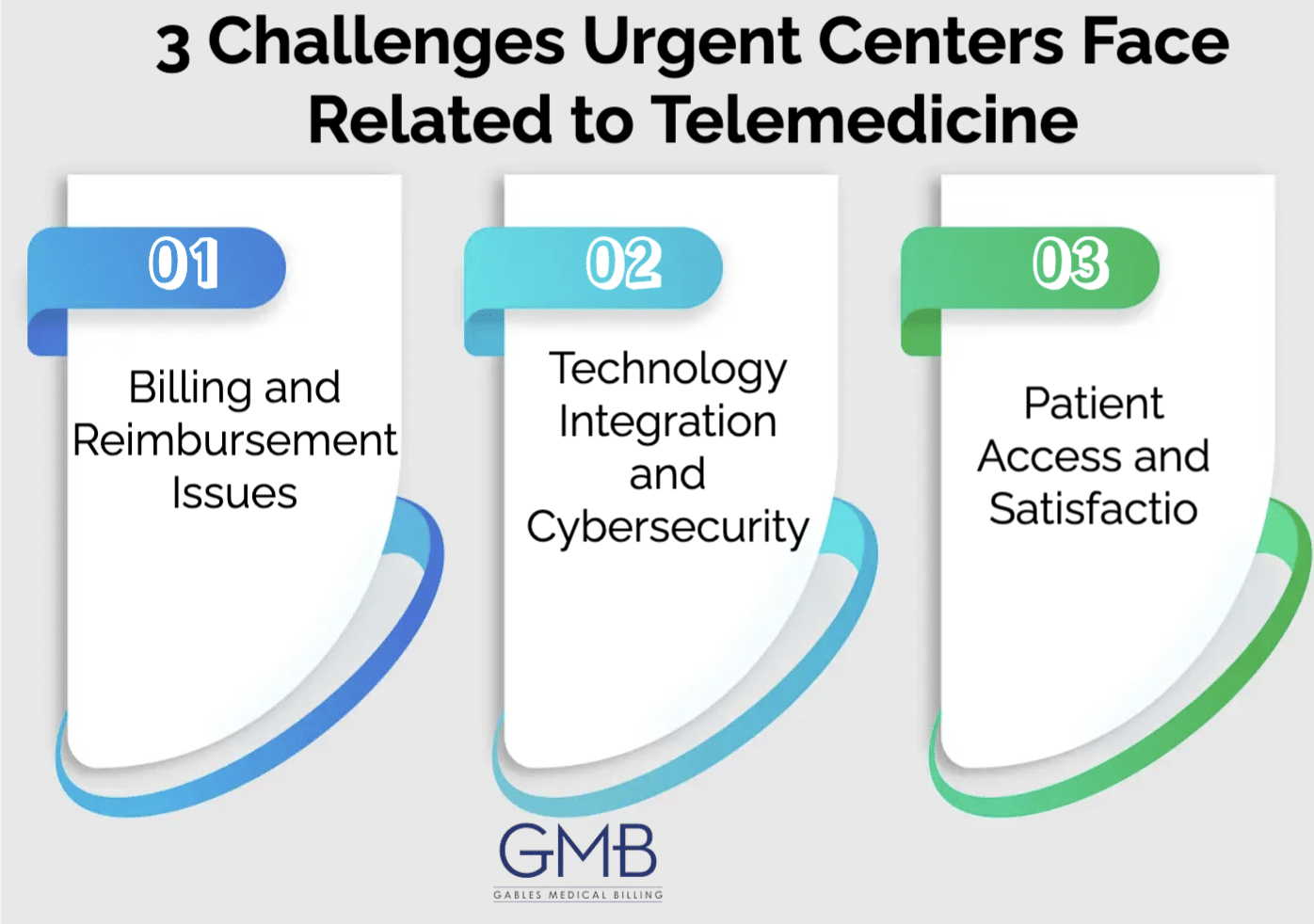
Telemedicine has revolutionized healthcare by offering convenient, remote access to medical professionals. Urgent care centers have embraced this technology, particularly in the wake of the global pandemic. However, along with the benefits of telemedicine come significant challenges. These challenges not only impact patient care but also the administrative aspects of managing urgent care centers. Let’s explore the top three challenges that urgent centers face in relation to telemedicine, particularly when it comes to Miami urgent care billing services.

1. Billing and Reimbursement Issues
Telemedicine billing is still a relatively new area, and many urgent care centers struggle with it. Unlike traditional in-office visits, telemedicine consultations have their own billing codes, policies, and reimbursement rates, which vary across insurance providers. The inconsistency in these policies is a significant hurdle for urgent care centers.
Urgent care billing services, including Urgent Care Billing Services, need to stay updated on a wide range of state and federal regulations as well as the individual policies of insurance companies. What complicates the process is that many insurance providers were initially slow to adjust their policies to include telemedicine as a reimbursable service. This has left many urgent care centers grappling with denied claims, delayed reimbursements, or confusion over which services are covered.
Some common billing issues related to telemedicine in urgent care include:
- Coding Confusion: Misinterpreting or misapplying telemedicine-specific billing codes often leads to claim denials. Unlike traditional visits, telemedicine services require different modifiers or place-of-service codes that urgent care centers must correctly apply.
- Reimbursement Rates: Insurance providers do not always reimburse telemedicine visits at the same rate as in-person consultations. Urgent care centers must stay vigilant to ensure they are appropriately compensated for the services provided.
- Unclear Policies: The policies surrounding telemedicine billing can vary widely depending on the payer. Keeping track of these variations and ensuring compliance is a major challenge, especially for centers that rely on outsourced Miami urgent care billing services.
Urgent care centers that provide telemedicine must invest in specialized billing solutions or services like Urgent Care Billing Services to navigate these complexities efficiently. Otherwise, they risk revenue losses, which can impact their ability to continue offering telemedicine services.
2. Technology Integration and Cybersecurity
Telemedicine requires robust technological infrastructure, and many urgent care centers face challenges when it comes to integrating this technology into their existing systems. The sudden surge in telemedicine services during the pandemic highlighted gaps in technological readiness, especially for smaller urgent care centers that may not have had the necessary resources or systems in place beforehand.
One of the biggest challenges is the integration of telemedicine platforms with existing electronic health record (EHR) systems. Ideally, telemedicine consultations should seamlessly integrate with the patient’s medical history and other important records. However, many urgent care centers encounter difficulties in making these platforms compatible. As a result, staff members often need to manually enter data from telemedicine visits into their EHR systems, which increases the risk of errors and adds to their workload.
Furthermore, cybersecurity is a pressing concern for urgent care centers offering telemedicine services. Handling patient information remotely introduces additional security vulnerabilities, as sensitive data is now being transmitted over the internet. These centers must adhere to strict regulations such as the Health Insurance Portability and Accountability Act (HIPAA) to protect patient information.
Some technology-related challenges include:
- Integration of Systems: Most urgent care centers use multiple software platforms to manage appointments, billing, and medical records. Integrating a new telemedicine platform with these existing systems can be cumbersome and expensive.
- Cybersecurity Threats: The rise of telemedicine has also increased the risk of cybersecurity breaches. Urgent care centers must invest in secure, encrypted platforms to safeguard patient information from cyberattacks.
- Training and Support: In addition to having the right technology in place, staff members must be adequately trained on how to use these systems. Without proper training, the likelihood of errors in data entry, patient management, and billing increases.
Investing in cutting-edge technology is crucial for urgent care centers to overcome these challenges. Partnering with Miami urgent care billing services that have experience in handling telemedicine billing can also help reduce the burden on in-house staff, allowing them to focus on patient care.
3. Patient Access and Satisfaction
While telemedicine has made healthcare more accessible, it has also introduced new barriers for some patient populations. Not all patients have access to the technology required for telemedicine consultations. This includes reliable internet connections, smartphones, or computers. As a result, certain segments of the population—particularly older adults and low-income individuals—may struggle to access telemedicine services.
In addition, not all patients are comfortable with the telemedicine format. Some may prefer in-person consultations for certain conditions or may not trust that telemedicine provides the same level of care. This can lead to lower satisfaction rates and missed follow-up appointments, which negatively impacts the overall patient experience at urgent care centers.
Common issues related to patient access and satisfaction include:
- Digital Divide: Many patients, especially in rural or underserved areas, lack access to the necessary technology for telemedicine. This creates a disparity in healthcare access.
- Patient Comfort: Some patients, particularly older adults, may not be comfortable using telemedicine platforms. This can result in missed appointments or reduced patient satisfaction, as they may feel that their concerns are not being fully addressed through a virtual visit.
- Follow-up Challenges: Telemedicine visits often lack the personal touch of in-person visits, and some patients may feel disconnected. This can lead to a lack of follow-through on recommended treatments or follow-up appointments.
To address these challenges, urgent care centers must find ways to make telemedicine accessible to all patients. This could include offering technical support, creating patient-friendly tutorials, or even providing devices to those in need. In addition, maintaining clear communication with patients about what to expect during a telemedicine visit can help alleviate concerns and improve satisfaction.
Telemedicine is here to stay, and while it offers many benefits, urgent care centers must navigate several hurdles to implement it effectively. With the help of reliable Urgent Care Billing Services, robust technology, and a focus on patient satisfaction, urgent care centers can overcome these challenges and continue to offer high-quality care in both virtual and in-person settings.
Conclusion
As telemedicine continues to grow in popularity, urgent care centers must remain vigilant in addressing the challenges it presents. Miami urgent care billing services can play a vital role in ensuring proper billing and reimbursement, while advanced technology solutions and patient-centric approaches can help overcome issues related to system integration and patient satisfaction. By tackling these challenges head-on, urgent care centers can continue to provide critical healthcare services to their communities, both in-person and through telemedicine.

